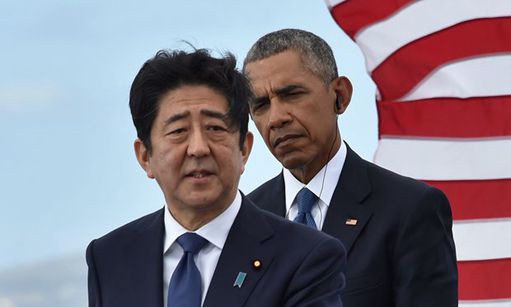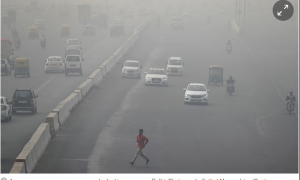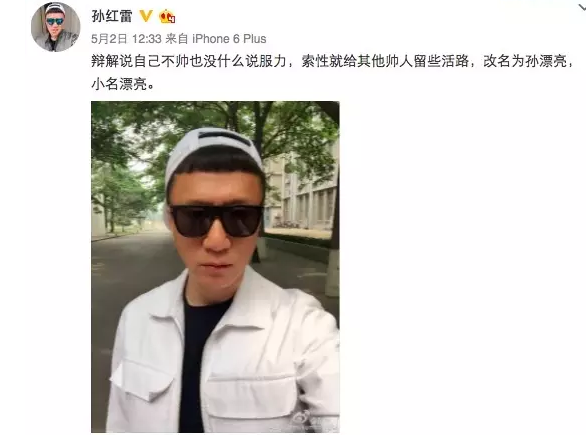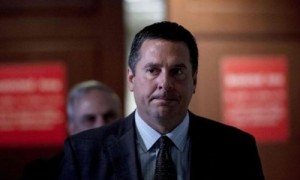导读:近日,安倍晋三造访美国亚利桑那号战舰纪念馆,同珍珠港幸存老兵进行交流,并承诺不让战争重现于世。

As the Japanese and American flags stood side by side, fluttering in gusty trade winds, Shinzo Abe – the first sitting Japanese prime minister to visit the USS Arizona Memorial to Pearl Harbor – offered his “sincere and everlasting condolences” for the attack that killed more than 2,400 Americans and prompted the US to enter the second world war.
日本与美国国旗并排而立,在信风中飘扬。安倍晋三是首位于任期内访问亚利桑那号战舰纪念馆的日本首相,他向在珍珠港袭击事件中丧生的2400余名美国人表达了“诚挚和长久的悼念”。珍珠港事件促使美国参加二战。
Standing next to US president Barack Obama he solemnly vowed that Japan “must never repeat the horrors of war again”.
安倍晋三在美国总统奥巴马身旁庄严宣誓日本“绝不会让战争的恐怖重现于世”。
On a historic, warm, December day, that will likely be their last official meeting, both men spoke of the power of reconciliation and the strength of the US-Japanese alliance.
这个十二月的上午温暖而又富有历史意义。当天,双方举行了可能是各自任内最后一次正式会晤,再次谈到了两国和解的能量和日美联盟的力量。
Standing on Kilo Pier before the USS Arizona Memorial —one of the most powerful symbols of modern battle — and a monument to war and loss, Abe made the case for peace.
安倍晋三在基洛码头上发表了寻求和平的演讲。基洛码头的前方是美国亚利桑那号战舰纪念馆和纪念碑,前者是珍珠港事件最鲜明的标志。
“As the prime minister of Japan, I offer my sincere and everlasting condolences to the souls of those who lost their lives here, as well as to the spirits of all the brave men and women whose lives were taken by a war that commenced in this very place … We must never repeat the horrors of war again.”
“作为日本首相,我向在此逝去的灵魂,和在此发生的战争中牺牲的英灵表达诚挚和长久的悼念。我们绝不会让战争的恐怖重现于世。”
Abe continued: “We, the people of Japan, will continue to uphold this unwavering principle, while harboring quiet pride in the path we have walked as a peace-loving nation over these 70 years since the war ended.”
安倍晋三继续说道:“我们日本人民将继续毫不动摇地遵守这项原则,而且我们对于自战后70年来作为一个热爱和平的国家所取得的成就感到十分自豪。”
Just as Obama did not offer an apology when he became the first sitting US president to visit Hiroshima Peace Memorial in May, Abe did not explicitly apologise but instead repeatedly spoke of reconciliation and what he called an alliance of hope between the two countries.
奥巴马是首位于在任期间访问广岛和平纪念碑的美国总统,他在访问过程中并未进行道歉。安倍晋三在讲话过程中也并未进行明显的道歉,反而一再强调和解的作用以及被其称为两国间充满希望的联盟之于关系的重要性。
President Obama followed Abe’s remarks, saying the US-Japan alliance was “a reminder that the deepest wounds of war can give way.”
奥巴马总统在安倍晋三发言结束后表示,美日联盟“提醒人们,哪怕是战争带来的最严重创伤也是可以愈合的。”
As he described laying flower wreathes on “waters that still weep,” Obama paid tribute to the “more than 2,400 patriots — fathers, husbands, wives and daughters manning heaven’s rails for all eternity.”
奥巴马为其描述的“仍在哭泣”的海水敬献花圈,向“包括父亲﹑丈夫﹑妻子和女儿在内的2400余名在天堂安息的同胞”表达敬意。
Obama’s statements weren’t confined to messages of reconciliation. He also reflected on “how war tests our most enduring values,” stating that even as Japanese-Americans were deprived of their own liberty during the war, they served the United States military with distinction.
奥巴马的发言并未局限在传达和解的信息。他做出反思,表示即使日裔美国人在战争期间同样丧失了自由,他们出色地为美军服务,表明“战争是如何考验我们长久以来秉持的价值观的”。
Among a gathering that included staid suited Japanese dignitaries and officials, active duty US military members, second world war veterans and their families, was congresswoman Colleen Hanabusa, a fourth-generation Japanese-American.Both of her grandfathers were sent to internment camps and she had an uncle who was killed in the atomic bombing of Hiroshima.
当天在场的有穿着古板的日本政要,仍在服役的美国军方人员,二战老兵和其家人。一位名为花房若子的女性国会议员亦是其中一员,她属于第四代日本移民。若子的祖父母当年被押往日裔美国人的集中营,她的一位叔叔死于广岛原子弹轰炸。
Hanabusa said the most important thing about the visit was that both Abe and Obama were physically present together.
若子认为,此次访问最重要的意义在于安倍晋三和奥巴马共同出席。
“The lesson from all this, was that we do not forget the past … but we have to move ahead,” Hanabusa said. “For us to all collectively survive in the Asia-Pacific region, we need have to have an understanding of both the roles in the past and the roles in the future.”
“我们应当吸取教训,铭记过去...但是我们同样应当面向未来”若子说道“对于在亚太地区生存下来的我们而言,我们必须理解彼此在过去与未来所扮演的角色。”
Also in attendance were three Pearl Harbor survivors, now in their nineties and cheerfully dressed in bright green, red and white Hawaiian aloha shirts. One of the survivors was 95-year-old Sterling R Cale who recalled the morning of the attack.
一同出席的还有三位当年珍珠港事件的幸存者,他们都已是耄耋之年的老人,身着绿﹑红﹑白三色相间的夏威夷衬衫。95岁的斯特林.R.卡莱回忆起了当天早上的情景。
Enlisted in the navy at the time, Cale said that on the morning of 7 December 1941 he had just finished night duty at the shipyard dispensary and was heading home when he looked up at the sky. “The planes were already diving. I saw one of the planes turn around — the rising sun on the fuselage. ‘My god! Those are Japanese planes,’” he recalled saying.
卡莱当时在海军服役,在1941年12月7日早上他刚刚完成了在船厂防治站的夜间任务。在准备回家时,他抬头望向天空“天上有飞机掉落下来。我看见其中的一架整个翻了过来--机身上印着太阳的图案。‘我的老天!这些都是日本人的飞机’”卡莱这般回忆道。
He and others broke down the door of the armory and rushed to hand out single-shot rifles to anyone able to help defend the base. Cale remembers spending four hours pulling 46 men, some already dead, from the water.
他和其他人破开了军火库的大门,向能守卫基地的士兵分发单发步枪。卡莱记得他们花了四个小时从水中打捞上来46人,有些人当时已经断气了。
Seventy-five years on, Cale was not asking for an apology from the Japanese prime minister. The fact that Abe came to Pearl Harbor, he said, was enough.
七十五年过去了,卡莱没有要求日本首相进行道歉。用卡莱的话说,安倍晋三出现在珍珠港的事实已经足够了。
“He might say ‘we’re sorry.’ So what?... I say the action is better than saying anything because it actually means they’re sorry,” then, speaking in Japanese, Cale asked, “wakarimasuka?” — do you understand?
“他也许会说‘我真的很抱歉’那又如何呢?要我说,行为比语言更有用,因为那实际上体现出了他们的歉意”。然后卡莱用日语说了一句“你明白吗?”。
Cale was one of three Pearl Harbor survivors present, all of whom Abe shook hands with and embraced.
卡莱是当天出席的三位幸存者之一。安倍晋三和三位幸存者一一握手拥抱。
Brad Glosserman, executive director of the Pacific Forum Center for Strategic and International Studies, a Honolulu-based think tank, called Abe’s visit a “big deal” that signified an eagerness to close the door on the postwar-era, but added that Japan must make similar gestures to its Asian neighbours if it is to “play the role to which it aspires in Asia and the world.”
布莱德·格罗斯曼是总部位于火奴鲁鲁的太平洋智库的执行董事,他称安倍此次的访问“意义重大”,彰显了日本为二战后时代自身行为盖棺定论的渴望。但是格罗斯曼还补充道,日本如果希望“在亚洲和全世界发挥自身期望发挥的作用”就应该对亚洲邻国做出相同的姿态。







